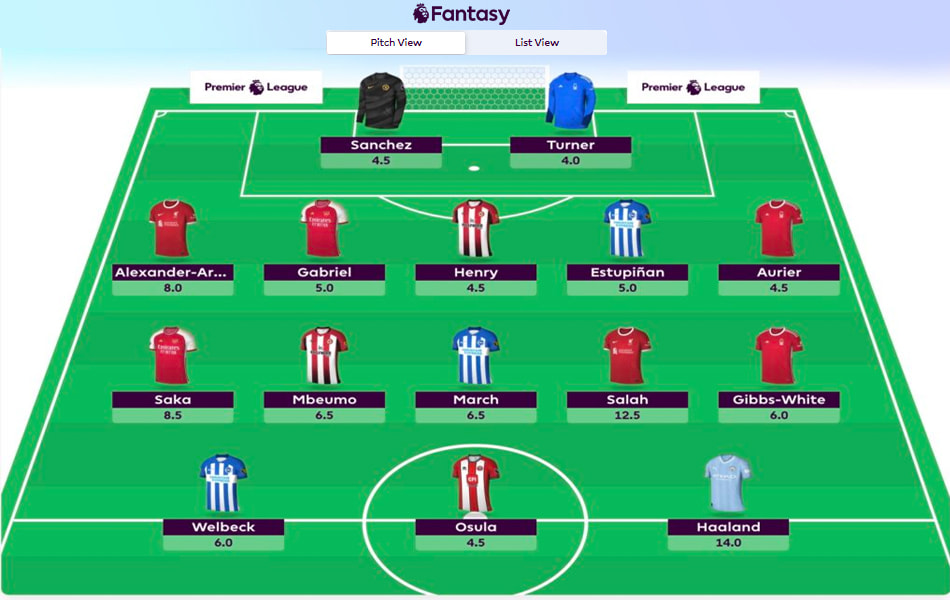Fantasy Premier League (FPL) is the official fantasy football game of the Premier League and is played by over 11 million fans globally. The basic premise is simple- assemble your squad and try to get as many points as possible. This guide will explain the basics, as well as some tips for the more advanced players.
Fantasy Premier League rules explained:
Squad Size
To join the game, you need to select a fantasy squad consisting of 15 players:
- 2 Goalkeepers
- 5 Defenders
- 5 Midfielders
- 3 Forwards
Budget
Your initial squad must be selected within a budget of £100 million.
Players Per Team
You can select up to three players from each Premier League club.
Choosing Your Starting 11
Each week, you choose 11 players for your starting XI. You can choose from a number of formations, but you must at least select:
- 1 Goalkeeper
- 3 Defenders
- 1 Forward
You also pick a captain and vice-captain, with the captain earning double points for that week. If a starter doesn’t play, the first bench player is automatically substituted. The first player off the bench must create a valid formation; if it doesn’t, then the second bench player will be substituted instead. In the case of a non-playing captain, the vice-captain’s points will be doubled, and the captain will be subbed out.
How Points Are Scored in Fantasy Premier League:
Points are awarded and deducted for actions like goals, clean sheets, and yellow cards.
Playing Time:
- Players earn 1 point for appearing in a match, and an additional point if they play 60 minutes or more. This encourages selecting players who consistently start matches.
Goals:
- Forwards earn 4 points per goal, midfielders 5, and defenders and goalkeepers 6. Goalkeepers now earn 10 points per goal. Midfielders and defenders with goal threat are particularly valuable.
Assists:
- All players receive 3 points for an assist. Pick players on free kicks and corners to improve the chance of an assist.
Clean Sheets:
- Goalkeepers and defenders get 4 points, and midfielders 1, for not conceding goals, provided they play at least 60 minutes. Clean sheet odds can indicate which teams have the best defenses.
Goals Conceded:
- Goalkeepers and defenders lose 1 point for every 2 goals their team concedes, highlighting the significance of a strong defensive performance.
Saves:
- Goalkeepers earn 1 point for every 3 saves made. This makes keepers from defenses that allow a lot of shots against them worth considering.
Penalties:
- A goalkeeper gets 5 points for saving a penalty, while players lose 2 points for missing one, reflecting the high stakes of penalty situations.
Discipline:
- Players receive a -1 point deduction for a yellow card and -3 for a red card.
Own Goals:
- A -2 point deduction for scoring an own goal discourages selecting error-prone players.
Bonus Points:
- The best performers in a match, according to the BPS, receive additional points (3 for the best, then 2, and 1), adding a layer of reward for exceptional individual performances.
How Transfers Work in Fantasy Premier League:
Each manager is given one free transfer every gameweek. If you don’t use your free transfer, it rolls over to the next gameweek, allowing you up to five free transfers (four carried over plus one new one). Each transfer beyond your free allocation costs a penalty of -4 points from your total score.
How FPL Chips Work:
In Fantasy Premier League (FPL), ‘chips’ are special tools that can significantly influence your team’s performance during the season. Understanding how to use these chips effectively is crucial for any FPL manager. Here’s a quick explanation of what each FPL chip does:
Wildcard:
- The Wildcard allows unlimited transfers in a single gameweek without any point penalties. There are two Wildcards available—one for use in the first half of the season and the other for the second half.
Free Hit:
- The Free Hit chip enables you to make unlimited transfers for one gameweek only. At the end of the gameweek, your team reverts to its original state.
Triple Captain:
- The Triple Captain chip triples the points of your captain for one gameweek instead of the standard double points.
Bench Boost:
- The Bench Boost chip allows the points of all your bench players to contribute to your total score for that gameweek.
Mystery Chip:
- A new chip to be announced during the season.
Key FPL Terminology:
Understanding the language of Fantasy Premier League (FPL) is crucial for new players. This section expands on key FPL terms, providing clear explanations for beginners to help navigate the game effectively.
DGW (Double Gameweek):
- A Double Gameweek occurs when some teams have more than one match within a single FPL gameweek.
BGW (Blank Gameweek):
- A Blank Gameweek refers to a gameweek where some teams do not have a fixture and therefore their players won’t score any points.
Budget Enabler:
- Budget Enablers are inexpensive players who are not necessarily big point scorers but allow you to free up funds to spend on more expensive, high-scoring players.
Effective Ownership:
- Effective Ownership is a term that combines a player’s ownership percentage with the percentage of FPL managers who have captained them.
Frequently Asked Questions:
Is Fantasy Premier League free to play?
- Yes, Fantasy Premier League is completely free to play. There are no costs associated with creating a team and participating in the game, making it accessible to everyone with an interest in the Premier League and fantasy sports.
How do I sign up for an account?
- To sign up for an account, visit the official Fantasy Premier League website. Click on the ‘Sign Up’ or ‘Register’ button, fill in the required information, such as your email, a password, and some basic personal details. Once you’ve completed the registration process, you can start creating and managing your own FPL team.
Are there any other fantasy football games?
- Yes, besides Fantasy Premier League, there are several other fantasy football games available. Popular alternatives include the UEFA Champions League Fantasy, ESPN Fantasy Soccer, and the official UEFA EURO 2024 fantasy football. Each of these games has its own set of rules, formats, and sometimes, prizes, catering to different leagues and football events around the world.
Is there a prize for winning FPL?
- Yes, there are prizes for winning Fantasy Premier League. The top performers typically receive rewards, which can range from trophies and exclusive experiences to merchandise. The specific details of the prizes can vary each season and are usually announced on the official FPL website.
Can I have more than one account?
- No, you are not allowed to have more than one account in Fantasy Premier League. Each player is permitted to manage only one team per season.


